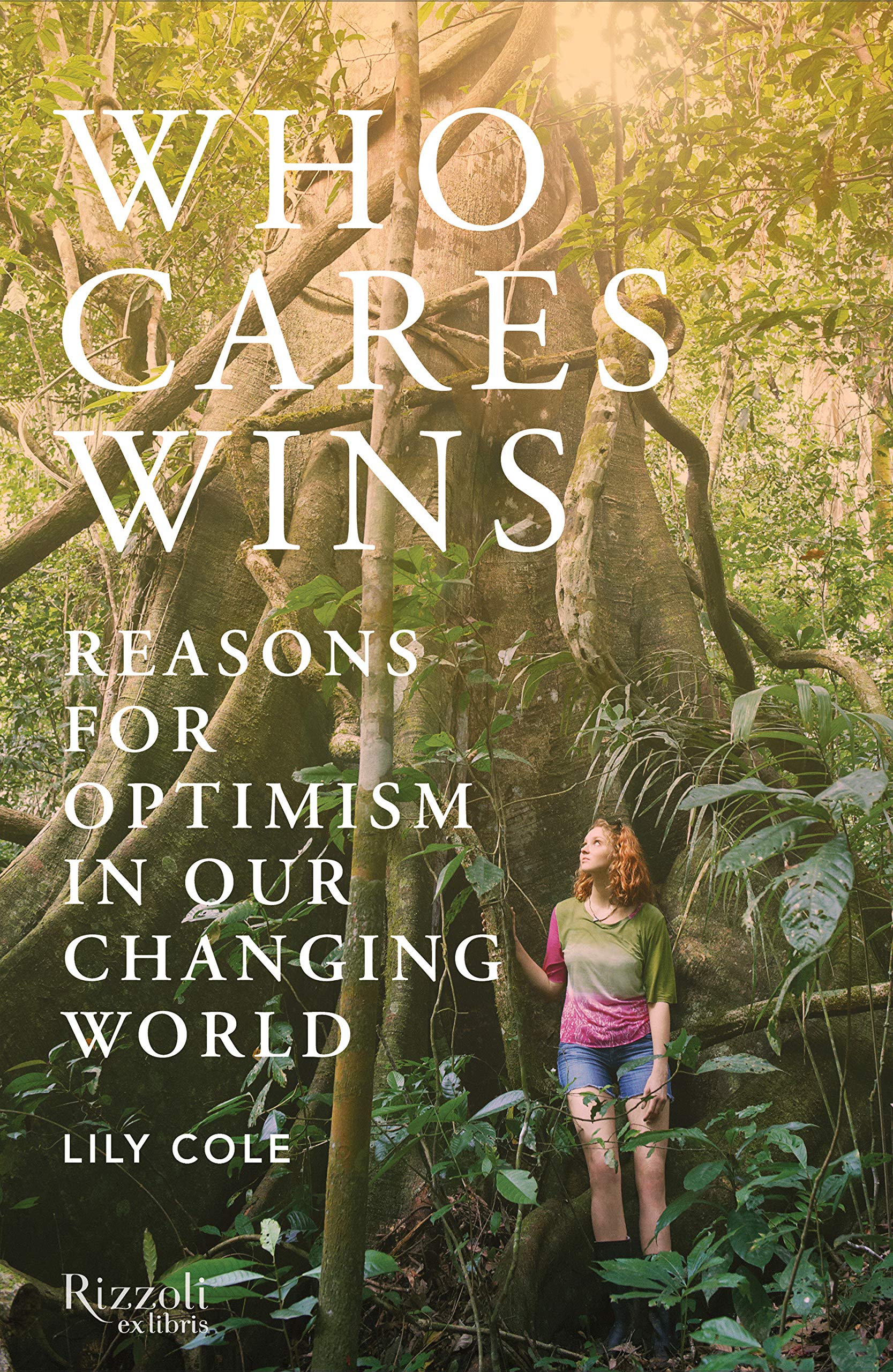Who Cares Wins: Reasons for Optimism in a Changing World
$8.99
A rousing call to action, this book will leave you feeling hopeful that we can make a difference in the midst of an age of turmoil, destruction, and uncertainty.
The climate crisis, mass extinctions, political polarization, extreme inequality–the world faces terrifying challenges that threaten to divide us, yet Lily Cole argues that it is up to us to actively choose optimism, collabo- rate, make changes, and define what is possible. Cole writes: “We are the ancestors of our future. The choices we make now and the actions we take today will define and transform future generations.” Having collaborated with experts working on solutions to humanity’s biggest challenges, Cole distills a vision for a sustainable and peaceful future. She explores divisive issues from fast fashion to fast food and from renewable energy to gender equality, and interviews some of today’s greatest influencers: Sir Paul McCartney (musician and activist), Elon Musk (CEO of SpaceX), Gail Bradbrook (cofounder of Extinction Rebellion), Farhana Yamin (climate change lawyer and activist), Emily Shuckburgh (climate scientist), Stella McCartney (sustainable fashion designer), Livia Firth (cofounder of Eco-Age), and Lisa Jackson (vice president of environment, policy and social initiatives at Apple, former Administrator of the EPA). The book also features a 32-page photo insert documenting Lily’s experiences around the world, as well as the artists, activists, and others who have inspired her, and her own–as yet unpublished–photography.
From the Publisher


From the Preface:
In the slim gap between my signing off the final text of this book affirming ‘Reasons for Optimism in Our Changing World’, and ink hitting the pages, our world changed, irrevocably. Or rather, the human world changed: the elemental world was changing a little less than usual. Who knew our machine could stop?
The Coronavirus pandemic has offered a shock to the global psychology unlike anything experienced in modern times. A collective arrest in the rehab of our homes, to explore the prisons or palaces of our minds. Whilst we huddle together (six feet apart if privileged enough to social distance) in fear, confusion, love, and hope, many voices are quickly proclaiming this is the wake-up call the world desperately needed. The pattern interruption, the stillness: a chance to reflect on our habits.
What will come next? When industries wake from their slumber, travel bans are lifted, when we can dance with strangers again – what will we have learned? Will we have made enough of a shift in how we think, consume, and live, to do things differently – to avert another crisis?
Disasters have always brought with them pivots along our historical path. The charged beauty of this moment is that almost anything is possible: both Orwellian and utopian narratives haunt us. Whilst Naomi Klein has analyzed how the shock of disasters has been misused to instate authoritarian regimes, conversely, crises have often led to very progressive changes: many national health services working hard today were a result of the 1918 flu epidemic; the First World War helped emancipate women; the Second led to the founding of the United Nations and modern welfare states.
Coronavirus has revealed our capacity for collective mobilization, kindness, and how quickly everything can be transformed. More has changed in a matter of weeks than many of us thought possible in years: and more will change again.
Might this experience enable us to fundamentally realize how connected we are with each other and the Earth? Could it wake us up to the huge financial and social costs of an exploitative relationship with nature? Might governments use this opening to make bold, positive policy shifts? What types of business do we want to survive? How will our values be transformed?
In the introduction to this book, I recall the fable of the frog in water – as a metaphor for our response to the climate crisis. The story went that a frog would quickly jump out of boiling water, but would stay in water that imperceptibly warmed, until its end.
The climate crisis emerges gradually. Too quickly for many of the Earth’s species to adapt to, but too slowly for our imaginations to track. Seven million people dying annually of air pollution (nearly 20,000 a day)* would be shocking if it happened suddenly – but it has been a slow boil to get to that number, and it creeps ever higher.
Coronavirus poured boiling water upon us, and we jumped. Will we return to our collective trance? Or can we use this pause to consider new ways of being? I hope this book might offer a voice in the conversation we urgently have to have, and some seeds of ideas we can choose to help blossom in a new – and healthier – reality.
Lily Cole is an environmental activist, model, actress, and filmmaker. She holds an MA in history of art from the University of Cambridge, was an affiliate at the Berkman Klein Center for Internet & Society at Harvard University, and was awarded an honorary Doctor of Letters by the University of Glasgow for her contribution to humanitarian and environmental causes through social businesses. Cole has spoken at World Economic Forum in Davos, Google Zeitgeist conference, and Wired. She regularly writes for media including the Guardian, Huffington Post, Vogue, and Financial Times. Cole has directed multiple short documentaries. She was the Bronte Parsonage Museum’s creative partner for 2018, for whom she made her first fiction film.
Publisher : Rizzoli Ex Libris (July 31, 2020)
Language : English
Hardcover : 480 pages
ISBN-10 : 0847869326
ISBN-13 : 978-0847869329
Item Weight : 2.24 pounds
Dimensions : 6.2 x 1.44 x 9.5 inches
Description
Price:
[price_with_discount]
(as of [price_update_date] –
Details)

[ad_1]
A rousing call to action, this book will leave you feeling hopeful that we can make a difference in the midst of an age of turmoil, destruction, and uncertainty.
The climate crisis, mass extinctions, political polarization, extreme inequality–the world faces terrifying challenges that threaten to divide us, yet Lily Cole argues that it is up to us to actively choose optimism, collabo- rate, make changes, and define what is possible. Cole writes: “We are the ancestors of our future. The choices we make now and the actions we take today will define and transform future generations.” Having collaborated with experts working on solutions to humanity’s biggest challenges, Cole distills a vision for a sustainable and peaceful future. She explores divisive issues from fast fashion to fast food and from renewable energy to gender equality, and interviews some of today’s greatest influencers: Sir Paul McCartney (musician and activist), Elon Musk (CEO of SpaceX), Gail Bradbrook (cofounder of Extinction Rebellion), Farhana Yamin (climate change lawyer and activist), Emily Shuckburgh (climate scientist), Stella McCartney (sustainable fashion designer), Livia Firth (cofounder of Eco-Age), and Lisa Jackson (vice president of environment, policy and social initiatives at Apple, former Administrator of the EPA). The book also features a 32-page photo insert documenting Lily’s experiences around the world, as well as the artists, activists, and others who have inspired her, and her own–as yet unpublished–photography.
From the Publisher


From the Preface:
In the slim gap between my signing off the final text of this book affirming ‘Reasons for Optimism in Our Changing World’, and ink hitting the pages, our world changed, irrevocably. Or rather, the human world changed: the elemental world was changing a little less than usual. Who knew our machine could stop?
The Coronavirus pandemic has offered a shock to the global psychology unlike anything experienced in modern times. A collective arrest in the rehab of our homes, to explore the prisons or palaces of our minds. Whilst we huddle together (six feet apart if privileged enough to social distance) in fear, confusion, love, and hope, many voices are quickly proclaiming this is the wake-up call the world desperately needed. The pattern interruption, the stillness: a chance to reflect on our habits.
What will come next? When industries wake from their slumber, travel bans are lifted, when we can dance with strangers again – what will we have learned? Will we have made enough of a shift in how we think, consume, and live, to do things differently – to avert another crisis?
Disasters have always brought with them pivots along our historical path. The charged beauty of this moment is that almost anything is possible: both Orwellian and utopian narratives haunt us. Whilst Naomi Klein has analyzed how the shock of disasters has been misused to instate authoritarian regimes, conversely, crises have often led to very progressive changes: many national health services working hard today were a result of the 1918 flu epidemic; the First World War helped emancipate women; the Second led to the founding of the United Nations and modern welfare states.
Coronavirus has revealed our capacity for collective mobilization, kindness, and how quickly everything can be transformed. More has changed in a matter of weeks than many of us thought possible in years: and more will change again.
Might this experience enable us to fundamentally realize how connected we are with each other and the Earth? Could it wake us up to the huge financial and social costs of an exploitative relationship with nature? Might governments use this opening to make bold, positive policy shifts? What types of business do we want to survive? How will our values be transformed?
In the introduction to this book, I recall the fable of the frog in water – as a metaphor for our response to the climate crisis. The story went that a frog would quickly jump out of boiling water, but would stay in water that imperceptibly warmed, until its end.
The climate crisis emerges gradually. Too quickly for many of the Earth’s species to adapt to, but too slowly for our imaginations to track. Seven million people dying annually of air pollution (nearly 20,000 a day)* would be shocking if it happened suddenly – but it has been a slow boil to get to that number, and it creeps ever higher.
Coronavirus poured boiling water upon us, and we jumped. Will we return to our collective trance? Or can we use this pause to consider new ways of being? I hope this book might offer a voice in the conversation we urgently have to have, and some seeds of ideas we can choose to help blossom in a new – and healthier – reality.
Lily Cole is an environmental activist, model, actress, and filmmaker. She holds an MA in history of art from the University of Cambridge, was an affiliate at the Berkman Klein Center for Internet & Society at Harvard University, and was awarded an honorary Doctor of Letters by the University of Glasgow for her contribution to humanitarian and environmental causes through social businesses. Cole has spoken at World Economic Forum in Davos, Google Zeitgeist conference, and Wired. She regularly writes for media including the Guardian, Huffington Post, Vogue, and Financial Times. Cole has directed multiple short documentaries. She was the Bronte Parsonage Museum’s creative partner for 2018, for whom she made her first fiction film.
Publisher : Rizzoli Ex Libris (July 31, 2020)
Language : English
Hardcover : 480 pages
ISBN-10 : 0847869326
ISBN-13 : 978-0847869329
Item Weight : 2.24 pounds
Dimensions : 6.2 x 1.44 x 9.5 inches
[ad_2]











